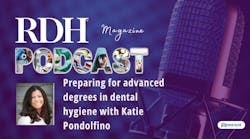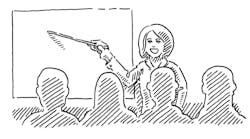Perspectives from a dental educator: Helping students understand all roles available to dental hygienists
I feel very fortunate as a dental hygiene educator to work with students in all levels of the AAS dental hygiene program at SUNY Broome Community College. It’s an extremely gratifying experience to observe student growth, from initial body language reflecting uncertainty, to self-assured in their abilities to obtain educational achievements.
As students advance with their clinical level of skills with instrumentation and patient difficulty, they retain fundamental knowledge and reflect critical thinking while progressing through each semester. Each level introduces new challenges and increases difficulty and expectations for student success.
In the final semester of the AAS dental hygiene program, educators prepare students to not only graduate from the rigorous program but also take their clinical exams—ADEX Dental Hygiene Examination and National Board Dental Hygiene Examination for licensure. Students become jubilant and radiate confidence, beaming with pride at their hard work, dedication, and accomplishments.
What else students need to learn
However, as the new graduates get ready to begin their well-deserved new careers, dental hygiene educators must provide them guidance for their future in the profession. The AAS degree opens doors to many different types of clinical practice the graduates can explore, such as public health in hospitals, community health clinics, elementary schools and universities, nursing homes, and even prisons.
They can also explore specialty practices, such as orthodontics, endodontics, periodontology, and pediatrics. Oral surgery can be exhilarating, and of course there’s general dentistry or private practice that offer a mix of everything. As a professional, the hygienist will assist with assessment, diagnosis, prevention, routine care, and patient education for oral health and oral disease.1
I also teach dental hygiene at the University of Bridgeport, Fones School of Dental Hygiene. Not only does this university offer associate level degrees, but it also provides dental hygiene students the opportunity to continue their education with an advanced degree in dental hygiene by providing bachelor’s and master’s programs. All dental hygiene institutions should be encouraging and supply their recent graduates with the tools for success in the form of information about advanced degrees in the profession.
The advantages of an advanced degree
I find teaching my dental practice management course very fulfilling as I observe the advanced degree students bring their experiences into the classroom and share their knowledge. Dental educators must thoroughly review all the professional roles for graduates, as well as help them understand that the profession is a lifelong commitment to continuing education to stay current in the profession and to consider all paths of change if they’re so inclined. Roles include public health, corporate, researcher, educator, administrator, and change agent/consumer advocate.2
After years of clinical practice or even with limited experience, those with advanced degrees have endless opportunities in the profession. Public health is a huge area and includes such opportunities as HeadStart and sealant and fluoride placement programs. There’s the chance to enter sales to sell hygiene and dental products or to research products in the corporate role. This takes some previous experience but is an excellent option to pursue.
Diving deep into research and clinical studies and staying up to date with current literature is a rewarding and intellectual choice as a professional researcher in the field. Educator is an excellent route, teaching the next generation and educating a new cohort of learners. A role in administration or management means helping run a dental practice and delegate responsibilities. Finally, there’s the chance to become a change agent and establish or assist with new legislation for dental hygiene, along with consumer advocates to create oral health programs to assist specific groups and help protect the oral health of consumers.
Students in the second stage of their career bring a different kind of teaching experience for dental educators. Students are motivated and driven, which enhances engagement in the courses as they feel valued when sharing their experiences. Returning graduates absorb new literature and topics in the profession, which contributes to classroom discussions that are full of rich insights, lending to different perspectives.
For students to succeed, educators must assist and support student development at each level of their education by offering them the proper environment and information to bloom. Students will be confident in their career, ready to take the next steps and eager to move forward.
References
- Ohrn K. The role of dental hygienists in oral health prevention. Oral Health Prev Dent. 2004;2 Suppl 1:277-281.
- Professional roles of an RDH. American Dental Hygienists Association. December 30, 2024. https://www.adha.org/education-resources/become-a-dental-hygienist/dental-hygiene-programs/professional-roles-of-an-rdh/
About the Author

Katie L. Pondolfino, BSDH, RDH, MAAL
Katie is an adjunct professor at Empire State University, where she teaches community health, leadership in health care, and health-care ethics; an adjunct professor at the University of Bridgeport in Connecticut, where she teaches dental practice management; and an instructor at SUNY Broome Community College, where she assists with all student levels in the hygiene program. She has 18 years of clinical experience and was a dental coordinator at the Greater Binghamton Health Center, a public health hospital.


